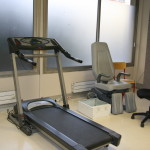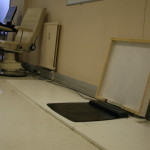Podiatry treatment clinic
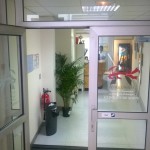
Why? Feet carry our body throughout the day throughout our lives: you should therefore never ignore pain which could worsen and become debilitating. Feet are ground supports, any static problems can cause pain away from the feet such as in the ankles, knees or back. Specialists should therefore be visited. Regular preventative consultations are worthwhile if you have diabetes or arthritis as the slightest pain can quickly cause complications. Obese, elderly or athletic people should also visit specialists for preventative reasons as they put a heavy strain on their joints. The slightest misalignment will go unnoticed among most people but with these categories it will worsen the risk of arthritis and joint pain for example. Over 75s are advised to visit a podiatrist every year even if they are not suffering from any issues.
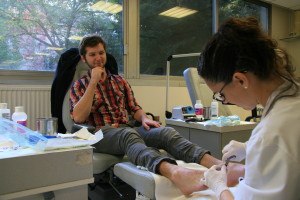
The Training Centre’s treatment clinic welcomes volunteer patients to help train students. Under the guidance of professional qualified and expert podiatrists working in the private sector, surveillance means appointments are better in terms of time and quality as they allow for a thorough treatment.
No medical prescription is required to receive treatment.
What’s it for?
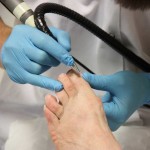
The Training Centre’s clinic guarantees patients receive the same quality service and treatment as those of private clinics.
It is a practical training centre for students. Treatment and equipment (insoles) is available to patients of all ages, athletes, lifestyles etc.
What we do here?
The treatment clinic provides any treatment related solely to podiatry (Public Health Code):
- Directly treating skin or nail infections in the foot.
- Providing personal care, making and applying insoles to alleviate skin ailments.
- Diagnosing and treating hyperkeratosis (calluses, corns) induced mechanically or not, by etiology or in different locations, ingrown nails, deformities induced mechanically or not and other skin or nail ailments in the foot.
- Prescribing, making and applying prosthetics and orthotics, onychoplasty (nail replacement), orthonyxia (nail braces), arthroplasty (toe braces), orthopaedic insoles and other podiatry equipment to prevent or treat skin or nail ailments in the foot.
- The clinic also provides clinical reports, baropodometry assessments (to quantify and measure foot pressure), gait analysis on the treadmill and on film, reports and studies of static (structural problems) and skin ailments in the foot and lower limb.
The training centre is involved in public health campaigns by screening feet at risk (diabetes, rheumatology issues etc.). It provides the patients affected with information and awareness.
How does it work?

Appointments are made over the phone or at reception. The patient is treated by the student. Treatments, guidance and advice are overseen by the teacher.
Treatment clinic opening times:
Monday to Friday
9am-1pm and 2pm-6.30pm
Students are monitored by healthcare professionals in podiatry, osteopathy and posturology. Most teachers are qualified in specific areas (university degrees in podiatry and sport, diabetes, wounds and scarring, oncology etc.). Podiatry therapy suggestions are implemented jointly with the patient.
Equipment
Safety and sterilisation
A teacher monitors the cleanroom’s functioning. The cleanroom was designed and installed by specialists in the industry. A sterilisation protocol was validated by the appropriate authorities. Sterilisation equipment is to AFNOR standard and checked every year.
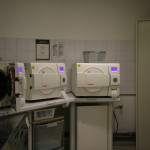

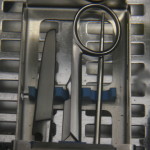
Traceability provides information about the cycle’s validity, the steriliser number and sterilisation dates. All sterile equipment has a barcode related to its journey in the sterilisation cycle. The equipment is tested to ISO standards every year.
This test is an annual one. It provides legal proof that the autoclave is applying the sterilisation process to standard (ISO 17665-1 §9.3) and that temperature parameters are respected in all areas.
The cleanroom also has 2 washer-thermo disinfectors, an ultrasonic cleaner, 2 disinfection units and 3 class B autoclaves (Prion test) linked to a water treatment system. Prion tests are routinely conducted. Prion is a type of pathogen which causes Creutzfeldt-Jakob disease in humans.
France 3 TV report on the IFPP Assas Treatment Clinic (YouTube video)



